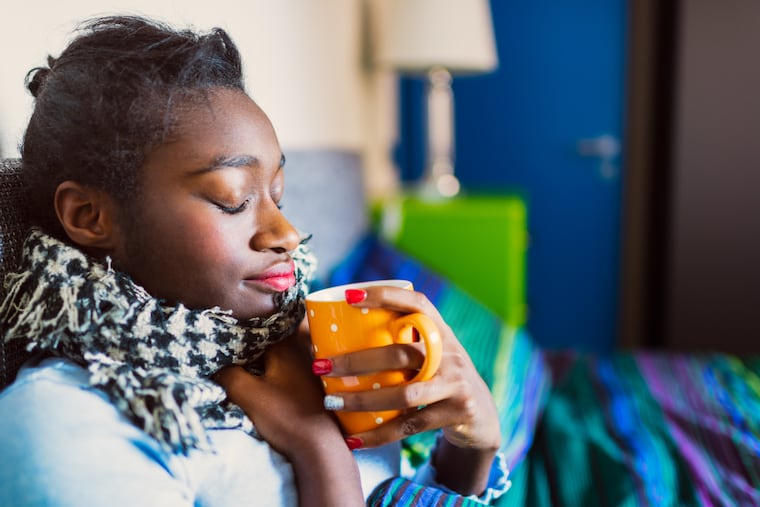What if someone in my house is sick? How to protect your household during coronavirus
Monitor the health of everyone in the home, minimize contact, disinfect regularly, and wash your hands often.

It’s never easy caring for and living with someone who is sick, and it’s even more stressful during a pandemic.
We’re here to help. There are concrete steps you can take to both help someone who is sick and also protect yourself and others in the home, experts say. (And of course, always seek medical advice when you need it, starting with your primary care physician.)
» READ MORE: Your coronavirus questions, answered
Monitor everyone’s health
One of the most important things is to monitor the health of the sick person and everyone else in the household, including yourself. Our understanding of COVID-19, including its symptoms, is changing rapidly, and there’s no surefire way to know whether someone has it without being tested. Just recently, loss of smell and taste and pink eye have popped up as possible symptoms of the coronavirus.
“It’s kind of a moving target,” said John Zurlo, division director of infectious diseases at Thomas Jefferson University Hospital in Philadelphia. “We’re seeing so many different manifestations.”
Still, the most common symptoms to watch for are a fever, a dry cough, and shortness of breath.
Should they get tested?
It depends. Whether someone should get tested, especially given limited testing capability, depends in part on how high a priority that person is, Zurlo said. Very sick patients in a hospital, health-care workers, and people who are most vulnerable are higher priority for testing, he said, than younger, healthier people. Some people might not even need to be tested, Zurlo said, because it wouldn’t change anything for them.
“Let’s say you’re a 20-something and you have a fever and maybe a cough and you call in. We’re not necessarily going to prioritize and say you should come in and get tested,” he said, “because we’re not going to change our management of those people so much.”
Call your primary care physician to discuss the symptoms and whether testing is necessary, and monitor the symptoms, such as tracking how high a fever goes and how long it lasts. And make sure to provide plenty of fluids to help the person stay hydrated while resting.
Minimize contact
In addition to monitoring health, the major keys are to — within reason — minimize contact with the sick person, regularly clean areas that the virus might live on, and practice good hand hygiene.
Minimizing contact means that in addition to limiting physical contact such as touching, you should avoiding using the same household items as the sick person.
“You should not share dishes, drinking glasses, cups, eating utensils, towels, bedding, or other items,” the CDC says. “After the patient uses these items, you should wash them thoroughly.”
If possible, try to sleep in another room and use a separate bathroom.
Clean regularly
Cleaning high-traffic areas will also help protect you and other members of the household. That means disinfecting high-traffic areas, such as door knobs and light switches, anywhere the virus may have spread.
» READ MORE: Coronavirus & cleaning: Which green products are effective against viruses?
There’s not a specific time frame for how often you should wipe these places down, said Jen Caudle, a family physician and professor at Rowan University’s School of Osteopathic Medicine: “A lot of it will depend on how much the surfaces are used, how often they’re touched, how much traffic they get.”
Think of it, she said, the way you would if someone with the seasonal flu is walking around the home. What areas would you disinfect to prevent them spreading it to you? Act similarly in this situation.
Wash your hands often
Last but certainly not least, Caudle said: Don’t forget to wash your hands. You’ve heard it over and over, and it’s especially important if you’re being exposed to someone who may have COVID-19. Washing your hands and not touching your face will help protect you even if you come in contact with the virus.
Wash your hands regularly, especially before and after cooking, before and after eating, and after contact with the sick person.
Do your best, but don’t panic
Don’t get overwhelmed worrying about not meeting every guideline perfectly. Every situation is different. Maybe you don’t have a separate bathroom. Maybe you can’t sleep in a different room.
Do what you can.
“We have to do only what we can do, right?” Caudle said.
“It simply may not be possible for some people, but understanding what the gold standard recommendation is” can help guide you: Monitor health, minimize contact, disinfect regularly, and wash your hands.
And remember, most people who become infected show only mild symptoms and recover without needing hospitalization or urgent medical care.
For more guidance on what to do if someone in your household has COVID-19 or is believed to, visit the CDC website here. The CDC also has guidance on disinfecting your home